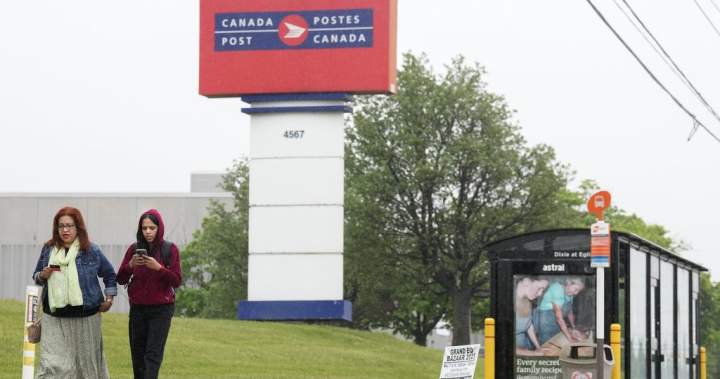With talks now resuming between Canada Post and the Canadian Union of Postal Workers (CUPW), many Canadians may be wondering what led to the current state of negotiations and what could happen next — including if there could be further strike action.
Wednesday’s meeting comes after Canada’s largest union of postal workers rejected the Crown corporation’s “best and final offers,” and as federal mediators are set to help the two sides try to reach a deal.
Last week, the CUPW said mediators were unavailable “due to their current involvement in the Air Canada negotiations,” before rescheduling to Aug. 20.
Although there is currently no nationwide strike, there is ongoing job action by the CUPW in the form of refusing overtime work.
Business owners have said the “uncertainty” of whether there could be another full strike like what happened late last year has led many to seek alternative delivery options.
As for what happens next if the two sides can’t reach a deal, CUPW informed members on its website that it is working to reach a deal while noting the possibilities in the event of either a strike or a lockout.
“Another possibility if either party engages in further strike or lock-out actions is the Government intervening again with back-to-work legislation or another section 107 order with binding arbitration,” the union said.
The negotiations date back to November 2023, when Canada Post’s contract with CUPW was set to expire, and it was one year later in November 2024 that the first strike action began.
The union has several key demands, including wage increases, a signing bonus, maintaining a defined benefit pension and job security clauses.

Get daily National news
Get the day’s top news, political, economic, and current affairs headlines, delivered to your inbox once a day.
One of the demands Canada Post has made, which has been a point of contention in the negotiations, is the use of contracted or part-time workers, which the union has argued against and has pushed for savings elsewhere.
In a statement, Canada Post said the part-time jobs will create stability and predictability for people looking for flexible work.
“The part-time positions will provide health and pension benefits and scheduled and guaranteed hours (15 to 40 hours of work per week),” a statement from Canada Post says.
“The creation of part-time jobs increases the company’s delivery flexibility, especially on weekends, while ensuring that letter carriers are not required to work weekend shifts.”
The CUPW said in its own statement that Canada Post wants the part-time workforce to handle weekend delivery, but the union is concerned this could impact job security for full-time workers.
“Under Canada Post’s proposal, weekend workers would be scheduled for 15 hours/week, mostly on the weekend, but they could also have shifts throughout the week. Canada Post could add more hours to these workers’ schedules in times of high workload,” the CUPW says in the statement.
“Canada Post’s proposal would all but eliminate overtime for full-time carriers, as part-timers with ‘flexible’ schedules would be offered more hours before full-timers were offered overtime.”
With the two sides unable to reach an agreement last year, the union of roughly 55,000 workers went on strike.
After several weeks on picket lines, then-labour minister Steven MacKinnon asked the Canada Industrial Relations Board (CIRB) to order postal workers back to work while a process to assess the challenges between them was carried out.
The CIRB ruled in favour of the proposal, and the strike ended on Dec. 17, 2024.
Although workers were ordered to end the strike action at the time, the contract Canada Post had with its employees was extended to May 2025 to allow more time for negotiations.
The union and Canada Post were still unable to come to an agreement on a new contract before May 2025, however, and the union issued another strike notice.
Canada Post tabled its “latest and final offers,” to the union, which was rejected, and prompted further negotiations between the company and the union.
Canada Post has said the ongoing negotiations and job action have led to millions of dollars lost every day and what it calls an “existential crisis.”
In May, Canada Post reported in 2024 the company saw a loss of $841 million before tax, and marked the seventh straight year of declines, adding the 32-day national strike “escalated” the “challenges” faced.
Canada Post also said in a statement regarding its offer to the union in May of 2025 that parcel volumes at the company have fallen 65 per cent since the same time last year.
A report released in May 2025 from a federal industrial inquiry commission said Canada Post’s financial issues make it “effectively insolvent.”
Read the full article here

